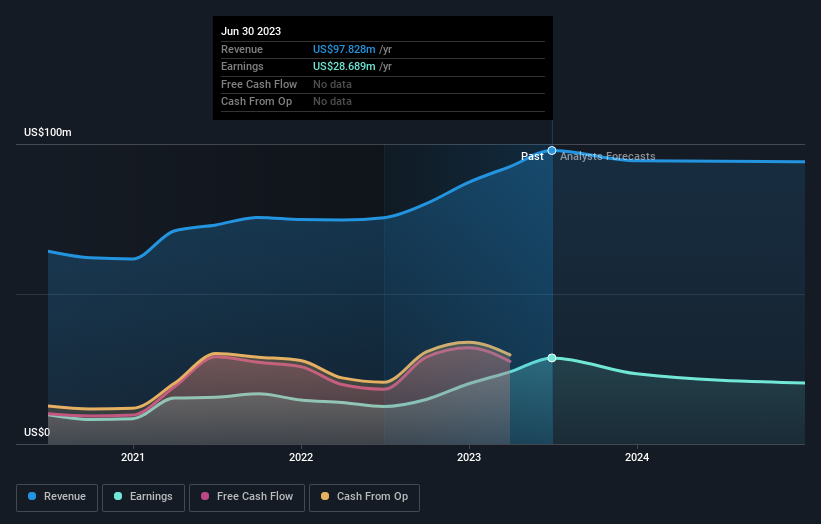While institutions own 38% of Codorus Valley Bancorp, Inc. (NASDAQ:CVLY), retail investors are its largest shareholders with 47% ownership
Key Insights
Codorus Valley Bancorp's significant retail investors ownership suggests that the key decisions are influenced by shareholders from the larger public
The top 25 shareholders own 46% of the company
A look at the shareholders of Codorus Valley Bancorp, Inc. (NASDAQ:CVLY) can tell us which group is most powerful. And the group that holds the biggest piece of the pie are retail investors with 47% ownership. Put another way, the group faces the maximum upside potential (or downside risk).
Meanwhile, institutions make up 38% of the company’s shareholders. Insiders often own a large chunk of younger, smaller, companies while huge companies tend to have institutions as shareholders.
Let's delve deeper into each type of owner of Codorus Valley Bancorp, beginning with the chart below.
See our latest analysis for Codorus Valley Bancorp
What Does The Institutional Ownership Tell Us About Codorus Valley Bancorp?
Institutional investors commonly compare their own returns to the returns of a commonly followed index. So they generally do consider buying larger companies that are included in the relevant benchmark index.
We can see that Codorus Valley Bancorp does have institutional investors; and they hold a good portion of the company's stock. This implies the analysts working for those institutions have looked at the stock and they like it. But just like anyone else, they could be wrong. If multiple institutions change their view on a stock at the same time, you could see the share price drop fast. It's therefore worth looking at Codorus Valley Bancorp's earnings history below. Of course, the future is what really matters.
It looks like hedge funds own 9.8% of Codorus Valley Bancorp shares. That catches my attention because hedge funds sometimes try to influence management, or bring about changes that will create near term value for shareholders. Looking at our data, we can see that the largest shareholder is FJ Capital Management, LLC with 9.8% of shares outstanding. In comparison, the second and third largest shareholders hold about 5.0% and 4.1% of the stock.
Our studies suggest that the top 25 shareholders collectively control less than half of the company's shares, meaning that the company's shares are widely disseminated and there is no dominant shareholder.
Researching institutional ownership is a good way to gauge and filter a stock's expected performance. The same can be achieved by studying analyst sentiments. There is a little analyst coverage of the stock, but not much. So there is room for it to gain more coverage.
Insider Ownership Of Codorus Valley Bancorp
The definition of an insider can differ slightly between different countries, but members of the board of directors always count. Company management run the business, but the CEO will answer to the board, even if he or she is a member of it.
Most consider insider ownership a positive because it can indicate the board is well aligned with other shareholders. However, on some occasions too much power is concentrated within this group.
Our most recent data indicates that insiders own some shares in Codorus Valley Bancorp, Inc.. In their own names, insiders own US$11m worth of stock in the US$209m company. Some would say this shows alignment of interests between shareholders and the board. But it might be worth checking if those insiders have been selling.
General Public Ownership
The general public-- including retail investors -- own 47% stake in the company, and hence can't easily be ignored. While this group can't necessarily call the shots, it can certainly have a real influence on how the company is run.
Next Steps:
It's always worth thinking about the different groups who own shares in a company. But to understand Codorus Valley Bancorp better, we need to consider many other factors. For example, we've discovered 2 warning signs for Codorus Valley Bancorp (1 is significant!) that you should be aware of before investing here.
If you are like me, you may want to think about whether this company will grow or shrink. Luckily, you can check this free report showing analyst forecasts for its future.
NB: Figures in this article are calculated using data from the last twelve months, which refer to the 12-month period ending on the last date of the month the financial statement is dated. This may not be consistent with full year annual report figures.
Have feedback on this article? Concerned about the content? Get in touch with us directly. Alternatively, email editorial-team (at) simplywallst.com.
This article by Simply Wall St is general in nature. We provide commentary based on historical data and analyst forecasts only using an unbiased methodology and our articles are not intended to be financial advice. It does not constitute a recommendation to buy or sell any stock, and does not take account of your objectives, or your financial situation. We aim to bring you long-term focused analysis driven by fundamental data. Note that our analysis may not factor in the latest price-sensitive company announcements or qualitative material. Simply Wall St has no position in any stocks mentioned.


